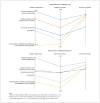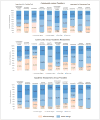Stakeholder Perspectives on Creating and Maintaining Trust in Community-Academic Research Partnerships
- PMID: 27230272
- PMCID: PMC6051524
- DOI: 10.1177/1090198116648291
Stakeholder Perspectives on Creating and Maintaining Trust in Community-Academic Research Partnerships
Abstract
Community-academic research partnerships aim to build stakeholder trust in order to improve the reach and translation of health research, but there is limited empirical research regarding effective ways to build trust. This multisite study was launched to identify similarities and differences among stakeholders' perspectives of antecedents to trust in research partnerships. In 2013-2014, we conducted a mixed-methods concept mapping study with participants from three major stakeholder groups who identified and rated the importance of different antecedents of trust on a 5-point Likert-type scale. Study participants were community members ( n = 66), health care providers ( n = 38), and academic researchers ( n = 44). All stakeholder groups rated "authentic communication" and "reciprocal relationships" the highest in importance. Community members rated "communication/methodology to resolve problems" ( M = 4.23, SD = 0.58) significantly higher than academic researchers ( M = 3.87, SD = 0.67) and health care providers ( M = 3.89, SD = 0.62; p < .01) and had different perspectives regarding the importance of issues related to "sustainability." The importance of communication and relationships across stakeholders indicates the importance of colearning processes that involve the exchange of knowledge and skills. The differences uncovered suggest specific areas where attention and skill building may be needed to improve trust within partnerships. More research on how partnerships can improve communication specific to problem solving and sustainability is merited.
Keywords: collaboration; community-based participatory research; translational research; trust.
Conflict of interest statement
The authors declared no potential conflicts of interest with respect to the research, authorship, and/or publication of this article.
Figures


References
-
- Alexander JA, Weiner BJ, Metzger ME, Shortell SM, Bazzoli GJ, Hasnain-Wynia R, … Conrad DA. Sustainability of collaborative capacity in community health partnerships. Medical Care Research and Review. 2003;60(4 Suppl):130S–160S. - PubMed
-
- Aronson M, Blaney N, Stephan C, Sikes J, Snapp M. The jigsaw classroom. Beverly Hills, CA: Sage; 1978.
-
- Barnett M, Anderson J, Houle M, Higginbotham T, Gatling A. The process of trust building between university researchers and urban school personnel. Urban Education. 2010;45:630–660.
MeSH terms
Grants and funding
LinkOut - more resources
Full Text Sources
Other Literature Sources

